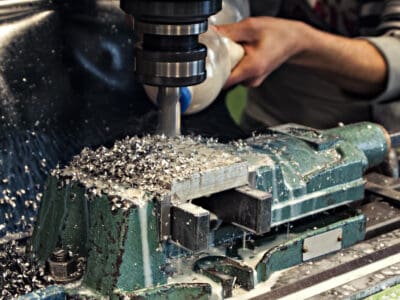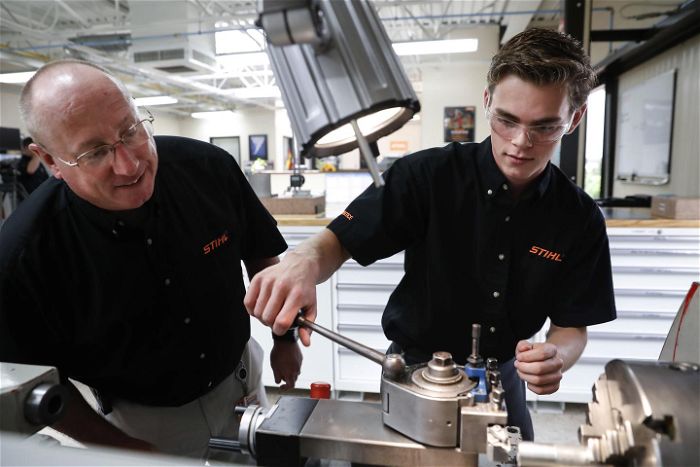
Widen the Net: A Sensible Way to Increase the Supply of Skilled Labor in Manufacturing
October 4, 2019
For years, manufacturers have been delivering an urgent message: We desperately need trained workers who have both technical expertise and the soft skills that are critical in environments where collaboration, communication, and resourcefulness are paramount.
In today’s rapidly changing economy, manufacturers are looking to previously untapped talent pipelines to fill their needs—and the workforce field is responding with innovative solutions. Lately, we are seeing an extraordinary surge in the emergence of new training programs and strategies launched by organizations dedicated to equipping workers with the skills they will need to succeed in a new era of manufacturing.
In today’s rapidly changing economy, manufacturers are looking to previously untapped talent pipelines to fill their needs—and the workforce field is responding with innovative solutions.
At JFF, we are in a prime position to observe the ongoing transformation of the labor market and assess emerging trends in talent development. Through our work leading the U.S. Department of Labor’s Single Industry Partner and American Apprenticeship Initiative contracts, we have worked with hundreds of organizations and registered thousands of apprentices.
Today is Manufacturing Day, a time dedicated to highlighting the career opportunities available in today’s manufacturing industry. In recognition, we wanted to highlight several of the promising programs JFF has worked with or come across. All of them are initiatives that seek to close the talent gap for manufacturers by preparing today’s labor force for the future of work.
Why New Talent Pipelines Are Needed
In July 2019, the number of U.S. manufacturing job openings reached an incredible high of 522,000. That statistic, coupled with the following findings of a 2017 industry needs assessment report—prepared by a collaborative group of stakeholders, including JFF, the Wisconsin Regional Training Partnership (WRTP), and the AFL-CIO Working for America Institute—reveal the broad scope of needs for today’s manufacturing workforce:
- 75 percent of surveyed manufacturers said they were planning to hire workers in the next two years. Of those, about 48 percent said they needed to hire people to replace retirees and 41 percent attributed their hiring needs to business growth.
- 56 percent of the respondents said external factors adversely influenced their business growth, and 69 percent said finding qualified workers hindered their ability to grow, add more product lines, or accept new contracts.
- Nearly 81 percent of the manufacturers polled said that a limited supply of people with the right skills was the most significant reason why they had difficulty replacing retirees. More than half said difficulty finding people with technical skills was the problem, and 48 percent said the skills gap was due to a lack of math, reading, and writing competencies, as well as softer skills and character traits like teamwork, initiative, attendance, and problem-solving.
Tapping New Talent Pipelines
The needs of today’s employers, including manufacturers, cannot be satisfied by a status quo workforce.
More and more employers are recognizing the need for, and supporting the development of, new talent pipelines, such as those that include people with disabilities, Spanish speakers, and young people.
Creating an Accessible Workplace for People with Disabilities
More than 15 million people of working age in the United States have a disability, and only 30 percent of them are employed. And most of those who are working are self-employed or hold part-time positions.
The Apprenticeship Inclusion Models (AIM) initiative seeks to expand career pathways for people with disabilities. AIM is a two-year initiative of the U.S. Department of Labor’s Office of Disability Employment Policy (ODEP) in partnership with JFF, Social Policy Research Associates, and Wheelhouse Group.
The AIM team will work with four apprenticeship programs, including the Industrial Manufacturing Technician (IMT) apprenticeship program, to research, develop, test, and evaluate innovative strategies for bringing people with disabilities into work-based learning programs.
For its part, the IMT is piloting a technology solution—the Center for Applied Special Technology’s STEMFolio—in an effort to offer people with learning disabilities expanded opportunities to participate in pre-apprenticeship programs. CAST’s STEMFolio is an interactive online portfolio that people can use to demonstrate their skills and knowledge in multiple ways, depending on their learning styles. Instructors can also use the STEMFolio portal to monitor student progress and give feedback in whatever way the student processes it best.
Our work in AIM has just begun. We are looking forward to sharing insights and findings from this work that will help manufacturers and other employers create the structures that will support apprentices with disabilities.
Training en Español
One in five people in the United States speaks a language other than English at home. Most often, that language is Spanish.
A program called Growing Opportunities in America for Latinos (GOAL!) recognizes that for some native Spanish speakers, language can be a barrier to entering and advancing in a manufacturing career in the United States. To help reduce that barrier, GOAL! combines English language instruction with a Spanish version of the coursework for the Manufacturing Skill Standards Council’s (MSSC) Certified Production Technician (CPT) credential.
GOAL! is funded by a U.S. Department of Labor TechHire Grant to the Labor Institute for Training (LIFT), an Indiana-based workforce intermediary. JFF provides executive support and services to assist with LIFT’s program delivery.
Participants say that GOAL! not only increases their skills and knowledge, but also helps them develop a sense of belonging. Some companies supplement the curriculum with other training opportunities. For example, Lippert Components in Indiana offers online English classes for its employees. Julio Cruz, a personal development coach at Lippert, reports that the company finds that those kinds of investments in its workforce “have been extraordinarily beneficial for our team members, and for Lippert. Our turnover rate has decreased from 120 percent to less than 30 percent.”
Nearly 26 percent of the GOAL! enrollees are women, and 40 percent are young adults ages 17 to 29—who have many years of employment ahead of them.
Changing Young People’s Minds About Manufacturing
In South Carolina, the SC Technical College System runs a program called Youth Apprenticeship Carolina to offer young people work-based learning opportunities and, in the process, change the perceptions that many young people and parents may have about careers in manufacturing and other high-demand industries. Many people incorrectly assume that manufacturing positions are poorly paid with limited opportunities for career advancement and involve repetitive work that is vulnerable to automation.
To illuminate the real opportunities that manufacturing careers have to offer, Charleston-based Youth Apprenticeship Carolina has opened up Registered Apprenticeship programs in a wide array of professions, including industrial mechanics and machine tool technology, to highly motivated high schoolers. In addition to taking their high school classes, students in the program attend classes at local technical colleges and receive on-the-job training from local employers—and they earn paychecks for the work they do.
It’s a new program, but 71 students have already signed on as apprentices with 43 local businesses.
Today’s Talent Drives Tomorrow’s Growth
That’s just a quick look at a few of the many initiatives employers, educators, and other workforce professionals across the country have launched in an effort to close the manufacturing skills gap by tapping talent pipelines that have been overlooked in the past.
In addition to English language learners, people with disabilities, and young people who may not have considered careers in manufacturing, other groups that employers are reaching out to include people in recovery from addiction, opportunity youth, people re-entering the workforce, and refugees.
By mining sources such as those and cultivating a diverse workforce, manufacturers have an opportunity to not only alleviate the pressure of the talent shortage they’re facing today, but also drive innovation and business growth.
By mining sources such as those and cultivating a diverse workforce, manufacturers have an opportunity to not only alleviate the pressure of the talent shortage they’re facing today, but also drive innovation and business growth.

Giving Manufacturing Career Pathways a LIFT
This book chapter from an upcoming compilation explores the way the Industrial Manufacturing Technician apprenticeship supports workers and companies’ needs. This book chapter from an upcoming compilation explores the way the Industrial Manufacturing Technician apprenticeship…

Making On-the-Job Training Work: Lessons from the Boeing Manufacturing On-the-Job Training Project
Making On-the-Job Training Work: Lessons from the Boeing Manufacturing On-the-Job Training Project This brief explores one promising on-the-job training model: the Boeing Manufacturing On-the-Job Training Project, funded by The Boeing Company and managed by the…
